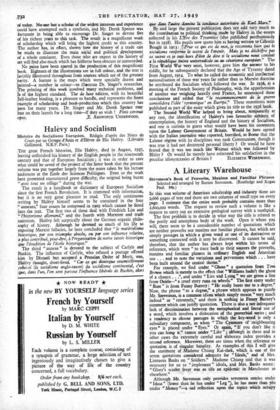Halevy and Socialism
THE great French historian, Elie Halevy, died in August, 1937, leaving unfinished, his history of the English people in the nineteenth century and that of European Socialism • it was in order to save what could be saved of the project of the Tatter book that the present volume was put together largely from the notes taken by his lecture 'audiences at the Ecole des Sciences Politiques. Even so the work here presented encountered grave difficulty, the original being burnt " avec tout un village" during the war.
The result is a handbook or dictionary of European Socialism since the first French Revolution. It is crammed with information, but it is no very great pleasure to read. The only continuous writing by Halevy himself seems to be contained in the four " annexes," four essays he composed in 1903 which cannot be fitted into the text. The first two of these deal with Friedrich List and "Phistorisme allemattd," and the fourth with Marxism and trade unionism. Halevy felt sceptically about the German organic philo- sophy of history. Although he devoted so much of his life to exposing Marxist fallacies, he here concluded that "le materialisme historique, par son Triomphe absolu, ors par son influence relative, a plus contribui, peut-titre, a ?organisation de. notre savoir historique que Perudition de Pecole historique." The third " annexe " is devoted to the subject of Carlyle and Ruskin. The influence of Carlyle, who refused a peerage offered him by Disraeli but accepted a Prussian Order of Merit, was, Halevy thought, short-lived: "Car re qui distingue esseittiellement ceini-ci (le socialisme anglo-saxon) du socialisme continental, c'est que, dans Pun, Pon sent partout Pinfluence liberale de Ruskin, albrs nue dans rware daniste la :audio:we autoritaire de Karl- Marx:*
By. and large the present publitation does not add very much to the contribution to political thinking made by Halevy in the. essays collected in his L5Ere des Tyrannies (also published posthumously but in 1938). His pupils now quote him as having written to Caestin Bougie in 1913: ."Pour ce qui est de moi, je reconnais hien que le socialisme renferme le secret de l'avenir. Mais je tie dichiffre pas ce secret et je suns- hors d'etat de dire si le SOCigliSlfie nova conduit a la republique suisse universalisie ou a s cat:risme estropeen." The First World War very soon, however, gave him the answer to his riddle, for he subsequently declared that the Age of Tyranny dated from August, 1914. To what he called the economic and intellectual nationalisation of those war years far rather than to Marxist doctrine he attributed the Socialism which followed the war. In 1936, at a meeting of the French Society of Philosophy, with the apprehension of another war weighing heavily over France, he announced these conclusions and added that " le reconuttencement de la guerre consolidera Pidie tyrannique' en Europe." These statements were published as part of the essay which gives its title to the 1938.hook.
The Second World War helped to bring about,. temporarily at any rate, the identification of Halevy's two favourite subjects of contemplation, the history of England and the history of Socialism, and one is curious to guess what would have been his comments upon. the Labour Government of Britain. Would he have agreed with the Italian journalist who reported, horrified, to Rome that the Labour regime with its disciplines was rank Communism, though it was true it had not destroyed personal liberty ? Or would he have feared that it was too much like Weimar which. was followed by Hitler ? Or would he merely have reiterated his satisfaction in the peculiar idiosyncrasies of Britain ? ELIZABETH WISICEMANN.






































 Previous page
Previous page